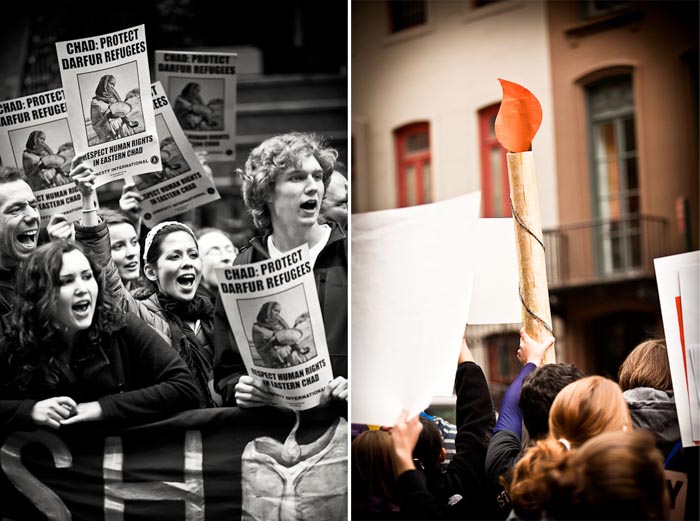At the February Group 133 meeting, the Group 133 Refugee Action Team and Larry Rich of the
Massachusetts Coalition to Save Darfur presented information about the GOTB 2011 Action calling for the protection of Darfuri refugees and Internally Displaced Persons (IDPs) living in eastern Chad.
Some History:
The Republic of Sudan is a large country in northeastern Africa. The people of Sudan have a long history reaching back into antiquity, which is intertwined with the history of its neighbor, Egypt. The Darfur region of eastern Sudan existed as an independent sultanate for several hundred years, and was incorporated into Sudan by Anglo-Egyptian forces in 1916. The modern country of Suden achieved independence from Egypt and the U.K. in 1956, and was overtaken with decades of civil war. The First Sudanese Civil War (1955-1972) followed ethnic, religious and economic lines between Northern Sudan and Southern Sudan. The war was reignited in 1983, leading to the Second Sudanese Civil War. The Colonel Omar al-Bashir gained control of the country in 1989 in a bloodless cout d'etat and named himself President of Sudan.
Conflict in Darfur:
The Darfur Conflict is an ongoing guerilla war which began in 2003, when the militant groups in Darfur took up arms, accusing the Sudanese government of oppressing non-Arab Sudanese. On the other side of the conflict are the official Sudanese military and police and the Janjaweed, a Sudanese militia group, recruited mostly from Arab tribes from northern regions of Sudan.
The ongoing conflict has led to some of the worst human rights abuses imaginable. The United States Congress declared the conflict in Darfur a genocide in June 2004, and President George W. Bush did the same in September of the same year. Hundreds of thousands of civilians have died as a result of both deliberate and indiscriminate attacks, and more than 2 million civilians have been forced to flee from their homes. The situation on the ground has been plagued with renewed violence, Janjawid attacks, and aerial bombing by the Government of Sudan's military. Currently, the Government of Sudan is resisting the UN Security Council-mandated peacekeeping operation that is desperately needed.
Amnesty representatives have met with UN, U.S. and European officials to call for their vigorous action and have pressed the governments of Chad and Sudan directly. Amnesty's global membership has also organized letter-writing campaigns and demonstrations to draw attention to the crisis.
Get On The Bus 2011 Action:
With the withdrawal of
MICURCAT peacekeepers at the end of last year, Amnesty International has expressed serious concern for the safety of refugees and IDPs in camps near Chad's border with Darfur. According to AI USA's Chad country specialist, Chad military personnel have already been implicated in a growing number of sexual assaults against women and girls in the camps, and have failed to protect them from the outside attacks. The threat to refugees and IDPs is expected to increase in 2011.
The 2011 Darfur/Chad GOTB action will call on the government of Chad to protect refugees from Darfur and IDPs in camps in eastern Chad, and in particular to ensure the safety of women and girls in the camps. Specifically, we will ask the government of Chad -
- to permit MINURCAT peacekeepers to return to eastern Chad,
- to provide greater protection to women and girls in refugee camps in eastern Chad, including refugees from Darfur and IDPs from Chad,
- to ensure that Chadian soldiers and security personnel cease all violations of the human rights of refugees and other displaces persons in the camps, and
- to ensure that all who have committed such violations are brought to justice.
The Conflict in Darfur has been a long and complex war, so the information I've provided here is certainly not exhaustive. I encourage readers to follow the links below to gain a wider perspective. The multimedia resources - photo galleries, documentaries and video footage, and satellite imagery - are much more powerful than any numbers I can write here.
Further Information:


